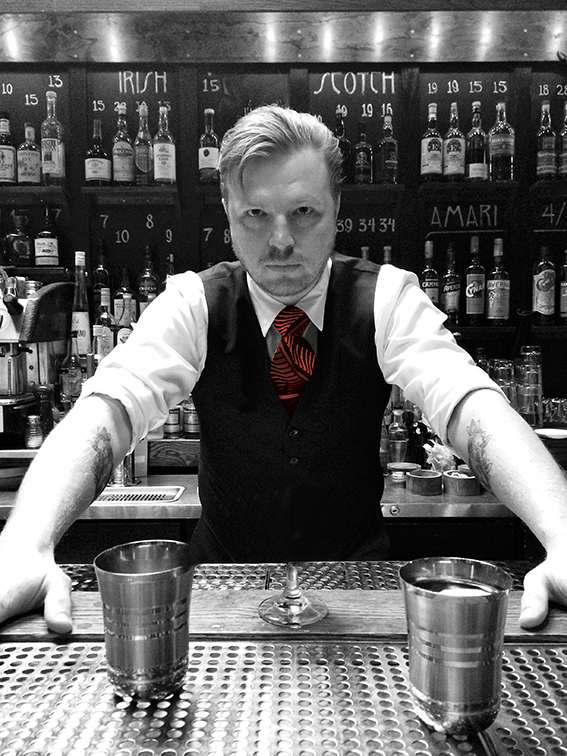Winter, 2012. Richard Boccato, the owner of Dutch Kills in New York City, and I are flown to Stockholm, Sweden, to bartend on behalf of Auchentoshan whisky and Havana Club rum. For the past three years, a restaurant in Copenhagen had been named number one in the world, and this was as close as I had gotten to that city. I talked Richie into going to Copenhagen and eating there. He made a call (he’s a little more connected than me), and got us a table.  For lunch. We flew to Copenhagen and took the train back to Stockholm the same day. I think anyone who has had the privilege of eating there would agree that the travel was worth it. Our first course was delivered by a big, tattooed chef with the line: “I heard you guys are from Brooklyn, I’m from Brooklyn too.”
For lunch. We flew to Copenhagen and took the train back to Stockholm the same day. I think anyone who has had the privilege of eating there would agree that the travel was worth it. Our first course was delivered by a big, tattooed chef with the line: “I heard you guys are from Brooklyn, I’m from Brooklyn too.”
This was my introduction to Lars Williams, although it is certainly possible we met in the very early ’90s and didn’t remember each other. New York City is a small town like that. After the meal, we spent every spare second before our train in the R&D kitchen with Lars and the talented Rosio Sanchez, stunned by assemblages of exotic ingredients on whiteboards and a collection of dried, fermented and pickled things pulled out of container after container. It was without doubt one of the best food experiences of my life.
Fast forward a few years and Noma is closed and moving, and Lars, like me, has moved from the food business to the booze business. It seems to me that he is applying the same combination of wild experimentation, dedication to excellent and often local ingredients and rigorous scientific approach that made his R&D life so successful. Empirical Spirits was founded in January of this year by Lars and his colleague, Mark Emil Hermansen, who was the head of development at the MAD Symposium, an annual Copenhagen gathering of farmers, chefs, academics, thinkers and artists.
They define Empirical Spirits as “a platform to investigate flavour, traditions, technologies and techniques from across the globe”. And “a springboard to re-examine how we build deliciousness, launch dialogues and create a whole bunch of novel libations along the way”.
Instead of using a traditional still, Lars hand-built a vacuum still to his exact specifications. He named it Diessel. This allows them to distill at very low temperatures, thereby retaining a different set of flavours than steam distillation would, and especially to coax more delicate flavors out of ‘soft’ ingredients, such as flowers, which are not in play in any of the four current products, but I imagine might be one day.
Another important step in the process is the production of all base spirit in-house, which allows the absolute most control of the end product. The base grain is barley and, for all but one of their products, the barley is inoculated with barley koji, the mould essential to sake production, which turns the starches in the barley to easily yeast-edible sugars. In this process it is analogous to the malting step in traditional scotch whisky making. This base spirit is then run through the still again with the desired flavour additions. For now, they are using Belgian Saison yeast, but are experimenting with custom strains from the yeast company they share space with, White Labs.
The freedom that Mark and Lars have carved out of the traditional categories has allowed them to create some truly unique products, and according to them “the sense of the woods just north of Copenhagen in Easy Tiger (one of their products), for example, can be shipped across the world and thus shared”. That is the very spirit of hospitality.
If you have access, in London or Copenhagen, check out their line: Easy Tiger, Charlene McGee blend, Fallen Pony Blend (made with rice koji), and the neutral spirit base, Helena.



